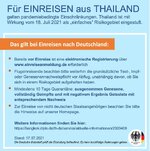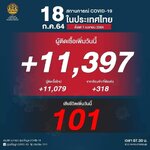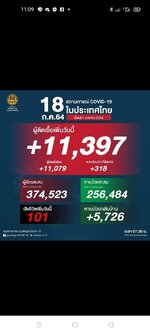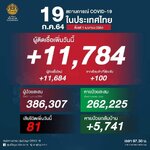Willkommen in unserer Community
Möchtest du dem Forum beitreten? Das gesamte Angebot ist kostenlos.
Registrieren
Du verwendest einen veralteten Browser. Es ist möglich, dass diese oder andere Websites nicht korrekt angezeigt werden.
Du solltest ein Upgrade durchführen oder einen alternativen Browser verwenden.
Du solltest ein Upgrade durchführen oder einen alternativen Browser verwenden.
News Thailand-News. Keine Diskussionen
- Ersteller ed
- Erstellt am
-
- Schlagworte
- nachrichten news thailand
Die thailändische Regierung bietet Australiern
Die Schlammschlacht in Thailand um Kontingente von den Impfquoten fuer Auslaender hat begonnen. Nachdem die Schweizer Botschaft damit begonnen hatte, Impfdosen aus dem thail. Impfprogramm fuer ihre Buerger zu reservieren war es klar, dass andere Nationen auf diesen Zug aufspringen wuerden. Gestern konnte man im Wochenblitz lesen, dass der DHV 150 Impfplaetze fuer Deutsche ueber 70 Jahren im thail. Impfprogramm reservierte

Das die Australische Botschaft dann nach dem oeffentlichkeitswirksamen Auftritt des australischen Ehepaars nachzieht, war zu erwarten.

Ich hatte am Donnerstag eine Gespraech mit einem Vertreter der deutschen Botschaft Bangkok (Rueckruf auf Grund einer Email meinserseits). Die deutsche Botschaft (war wohl ueber die Aktion des DHV nicht informiert oder wollte mir gegenueber dazu nichts sagen) wie auch die Botschaften der anderen EU-Staaten wollen sich an diesem Kampf um Impfdosen nicht beteiligen. Wie lange diese Allianz allerdings haelt bleibt abzuwarten.
Es ist nur bedauerlich dass hier einzelne Nationen vorpreschen und sich aus der eh geringen Impfquote fuer Auslaender Kontingente reservieren, die natuerlich zu Lasten dieser Quote geht. Denn es ist bei der derzeitigen Impfstoffknappheit nicht zu erwarten, dass die thail Behoerden die Quote fuer Auslaender erhoehen, nur weil einzelne Botschaften sich aus diesem Topf durch Reservierungen privilegiert bedienen.
Ich lasse mich mal ueberraschen fuer welche Auslaender dann die 300 000 Impfdosen von Pfizer reserviert werden, die die Auslaenderquote aus der USA-Impfstoffspende darstellt.
und genau in dieser Stimmungslage muss man sich jetzt diese Ohrfeige vorstellen,
die Astra Zeneka der Regierung verpasst,
indem er quasi sagt - die Regierung veröffentlicht Fake News,
um den Impfstoffmangel auf Astra Zeneka zu schieben,
doch
dem ist nicht so.
Wahrscheinlich hat AZ das letzte Schreiben an die Regierung eben auch der Presse zugespielt,
denn so beginnt der Artikel.
Man wollte wohl aus Liebe zu China, den 5x teureren weniger wirksamen Sinovac Impfstoff als Hauptstütze benutzen, die nun ja weggebrochen war.
Was danach passierte, war ein rumgeeiere der politischen Verantwortlichen,
die nach diesem Gesichtsverlust das Land quasi gegen die Wand fahren

 www.bangkokpost.com
www.bangkokpost.com
wer das liesst, wird nicht verstehen, warum man der einzigen Alternative, - den privaten Krankenhäusern,
das Importieren so schwer macht.
Was waren die Gedankenfehler
- man dachte, wir gehen den Weg von Australien, verschleppen das Impfen, treten dem Covax nicht bei, wer schwach ist, stirbt, wer stark ist, überlebt die Krankheit und imunisiert sich selber.
mit der Alpha Variante hätte das klappen können - mit Delta nicht.
- man setzte auf den China Impfstoff als Zwischenlösung, - danach sollte die landeseigene AZ Produktion das Land versorgen. Fürs erst und beginnende zweite Quartal war Sinovac eine Hilfe, doch mit der Ausbreitung der Delta Variante, war das Weiterimpfen mit Sinovac noch noch fürs politische Überleben da.
Was lief schief bei der Eigenproduktion ? Der Herstellungsprozess ist ein über 50 Schritte gegliederter Prozess, wo die Substanz nicht kontaminiert werden darf, und Sterilität das oberste Gebot ist.
Wenn man in England bei Temperaturen von 15 bis 20 Grad für Sterilität sorgt, ist das eine andere Nummer,
als wenn man unter tropischen 30 Grad Temperaturen für Sterilität sorgen muss, wo sich die Bakterien und Keime sprunghaft vermehren. Man kann schliesslich auch keine komplette Fabrik unter eine Glaskuppel stellen, wo Aircons für gewünschte Temperaturen sorgen.
Sowas hatte die Firma noch nie gemacht, und anders, als Marburg, wo man in 3 Monaten 270 Mio Dosen Impfstoff herstellen kann,
war Thailand mit der komplexen Anforderung überfordert, und der drohende Gesichtsverlust wurde mit einer Verschleppungstaktik begegnet, da ging die Zeit verloren, die jetzt fehlt.
Das wissen die Verantwortlichen, und jetzt der Öffentlichkeit AZ als den Übeltäter zu bezeichnen, ist keine Strategie mit Zukunft.
Um das Land nicht völlig in den Abgrund zu reissen, müssen jetzt Dealer ran, die den Impfstoff für die privaten Krankenhäuser aus Lagerbeständen in der arabischen Welt zusammenkaufen.
10 Mio Impfungen pro Monat war die Vorgabe
sinnloses Sinovac Impfen einstellen,
5 Mio AZ Dosen, die pro Monat geliefert werden, verimpfen,
und die Lücke von 5 Mio Dosen schnellstens durch kompetente Einkäufer schliessen
die Astra Zeneka der Regierung verpasst,
indem er quasi sagt - die Regierung veröffentlicht Fake News,
um den Impfstoffmangel auf Astra Zeneka zu schieben,
doch
dem ist nicht so.
Wahrscheinlich hat AZ das letzte Schreiben an die Regierung eben auch der Presse zugespielt,
denn so beginnt der Artikel.
Leaked correspondence between the Thai government and the Covid-19 vaccine manufacturer AstraZeneca has raised a big question about the former’s commitment to administer 100 million doses by the end of this year.
Isra News Agency on Saturday posted a letter sent by Sjoerd Hubben, vice-president for global corporate affairs of AstraZeneca Inc, to Public Health Minister Anutin Charnvirakul 22 days ago.
The letter explains to the ministry that the most Thailand would get from the European drugmaker’s local contract manufacturer would 5-6 million doses a month, which is consistent with their earlier discussions.
Man wollte wohl aus Liebe zu China, den 5x teureren weniger wirksamen Sinovac Impfstoff als Hauptstütze benutzen, die nun ja weggebrochen war.
Was danach passierte, war ein rumgeeiere der politischen Verantwortlichen,
die nach diesem Gesichtsverlust das Land quasi gegen die Wand fahren
Siam Bioscience Co Ltd, a company owned by His Majesty the King, was retooled to manufacture the vaccine. The government subsidised 600 million baht for the upgrade and officials later said the company would pay back the sum in the form of shots.
The letter caught many by surprise since the government had repeated many times that 100 million doses would be administered by the end of the year to inoculate at least 70% of the population, with 61 million of them being locally produced AstraZeneca.
On various occasions, the government assured people that AstraZeneca would supply at least 10 million doses a month for the rest of the year.
The question that naturally followed is what vaccines the government would buy to achieve that goal, especially when all sides have agreed that Sinovac, which is the most readily available, cannot effectively shield against the Delta variant of the coronavirus. Sinovac also costs at least four times more than AstraZeneca.
According to the letter, the Ministry of Public Health to date has placed two orders for 61 million doses of AZ vaccine in total. The first, concluded in January this year, was for 26 million doses, and the second, closed in May this year, was for 35 million doses.
These 61 million doses were part of the 175 million that Siam Bioscience has been contracted to make. Thailand is to get 34.9% of its output, or 5-6 million doses a month. The rest will be shipped to other countries, AstraZeneca says in the letter.
Furthermore, the letter revealed that in early September last year the government was committed to buying only 3 million doses a month. Therefore, AZ says it hopes Thailand should be pleased that it is now receiving 5-6 million doses a month.
The company also mentioned that it had urged the government back in September last year to enter the Covax vaccine-sharing facility, along with buying directly from manufacturers. Thailand is one of a handful of developing countries that have not joined Covax.
The dates when the agreements were actually concluded, as mentioned in the letter, also raised eyebrows. It showed the agreement for the second batch of 35 million doses was concluded as recently as May this year, even though the third wave has been raging through the country since the start of April.
Mr Anutin told Isra that Thailand had in fact reserved the supply early this year. In any case, the cabinet approved the budget for it on March 5 and it took two months after that to sign the agreement.
Dr Nakorn Premsri, director of the National Vaccine Institute, on July 2 was the first to reveal the shortfall of AstraZeneca supplies.
Deputy Public Health Minister Sathit Pitutecha also admitted on Thursday that AstraZeneca would not be able to deliver all 61 million doses under the two contracts until May next year. The original deadline was supposed to have been December.
Contrary to what people had assumed earlier, he said 10 million doses a month was in fact Thailand’s capacity to vaccinate people, not the number of vaccines it would get from AstraZeneca. He said the company had seen the vaccination plan but had said nothing.
The revelation had led some Thais to think it was AstraZeneca that had failed to honour the contract, potentially derailing the country’s immunisation plan.
The Opposition even urged the government to exercise its authority under the vaccine law to ban exports of Thai-made vaccines when there are shortages in the country.

Fate of 100m-dose vaccination hangs in the air
Leaked correspondence between the Thai government and the Covid-19 vaccine manufacturer AstraZeneca has raised a big question about the former’s commitment to administer 100 million doses by the end of this year.
wer das liesst, wird nicht verstehen, warum man der einzigen Alternative, - den privaten Krankenhäusern,
das Importieren so schwer macht.
Was waren die Gedankenfehler
- man dachte, wir gehen den Weg von Australien, verschleppen das Impfen, treten dem Covax nicht bei, wer schwach ist, stirbt, wer stark ist, überlebt die Krankheit und imunisiert sich selber.
mit der Alpha Variante hätte das klappen können - mit Delta nicht.
- man setzte auf den China Impfstoff als Zwischenlösung, - danach sollte die landeseigene AZ Produktion das Land versorgen. Fürs erst und beginnende zweite Quartal war Sinovac eine Hilfe, doch mit der Ausbreitung der Delta Variante, war das Weiterimpfen mit Sinovac noch noch fürs politische Überleben da.
Was lief schief bei der Eigenproduktion ? Der Herstellungsprozess ist ein über 50 Schritte gegliederter Prozess, wo die Substanz nicht kontaminiert werden darf, und Sterilität das oberste Gebot ist.
Wenn man in England bei Temperaturen von 15 bis 20 Grad für Sterilität sorgt, ist das eine andere Nummer,
als wenn man unter tropischen 30 Grad Temperaturen für Sterilität sorgen muss, wo sich die Bakterien und Keime sprunghaft vermehren. Man kann schliesslich auch keine komplette Fabrik unter eine Glaskuppel stellen, wo Aircons für gewünschte Temperaturen sorgen.
Sowas hatte die Firma noch nie gemacht, und anders, als Marburg, wo man in 3 Monaten 270 Mio Dosen Impfstoff herstellen kann,
war Thailand mit der komplexen Anforderung überfordert, und der drohende Gesichtsverlust wurde mit einer Verschleppungstaktik begegnet, da ging die Zeit verloren, die jetzt fehlt.
Das wissen die Verantwortlichen, und jetzt der Öffentlichkeit AZ als den Übeltäter zu bezeichnen, ist keine Strategie mit Zukunft.
Um das Land nicht völlig in den Abgrund zu reissen, müssen jetzt Dealer ran, die den Impfstoff für die privaten Krankenhäuser aus Lagerbeständen in der arabischen Welt zusammenkaufen.
10 Mio Impfungen pro Monat war die Vorgabe
sinnloses Sinovac Impfen einstellen,
5 Mio AZ Dosen, die pro Monat geliefert werden, verimpfen,
und die Lücke von 5 Mio Dosen schnellstens durch kompetente Einkäufer schliessen
Sonntag den 18.07.21
PHUKET: Testergebnisse von COVID-19-Antigen-Schnelltest-Kits für den Selbsttest zu Hause können nicht als Beweis für Reisen verwendet werden, hat der Direktor des Krankenhauses Vachira Phuket, Dr. Chalermpong Sukontapol, bestätigt.

 aseannow.com
------------------
aseannow.com
------------------
Das Ramathibodi-Krankenhaus setzt einige Dienste aus, da 300 mit COVID-19 infizierte Mediziner
Das Ramathibodi-Krankenhaus hat die Aussetzung aller elektiven Operationstermine und einiger Stationsdienste mit Ausnahme von Notfällen bis auf Weiteres angekündigt.

 aseannow.com
------------------
aseannow.com
------------------
Wie viele Thailänder hatte sich der erfahrene Journalist Wichit Chaitrong monatelang auf eine von der Regierung bereitgestellte COVID-19-Impfung gefreut – aber nicht mehr. Er änderte seine Meinung, nachdem er gehört hatte, dass die Einführung der Regierung Sinovac für die erste Dosis und AstraZeneca für die zweite verwenden wird – eine Mix-and-Match-Formel, die von keinem anderen Land ausprobiert wurde.

 aseannow.com
------------------
aseannow.com
------------------
BANGKOK (NNT) – Die Thailändische Rotkreuzgesellschaft hat bestätigt, dass die COVID-19-Impfstoffe der Marke Moderna, die sie unter den Bedingungen der Government Pharmaceutical Organization (GPO) gekauft hat, im letzten Quartal dieses Jahres und Anfang nächsten Jahres eintreffen werden.

 aseannow.com
-------------
aseannow.com
-------------
BANGKOK (NNT) – Die Polizei hat Demonstranten, die planen, sich am Sonntag, den 18. Juli, vor dem Demokratiedenkmal zu versammeln und das Regierungsgebäude zu betreten, gewarnt, dass sie gegen mehrere Gesetze verstoßen werden.

 aseannow.com
---------------
aseannow.com
---------------
BANGKOK (NNT) – Die Sicherheitsbehörden wurden aufgefordert, bei einem Treffen im Zusammenhang mit COVID-19 strenge Grenzkontrollen und Beschränkungen der Bevölkerungsbewegungen beizubehalten Fälle.

 aseannow.com
aseannow.com
PHUKET: Testergebnisse von COVID-19-Antigen-Schnelltest-Kits für den Selbsttest zu Hause können nicht als Beweis für Reisen verwendet werden, hat der Direktor des Krankenhauses Vachira Phuket, Dr. Chalermpong Sukontapol, bestätigt.

Results from COVID rapid antigen home test kits not accepted for travel
Dr Chalermpong with a home test kit. photo: PR Phuket By The Phuket News PHUKET: Test results from COVID-19 rapid antigen test kits for self-testing at home cannot be used as evidence in order to travel, Vachira Phuket Hospital Director Dr Chalermpong Sukontapol has confirmed. The Thai Food and D...
Das Ramathibodi-Krankenhaus setzt einige Dienste aus, da 300 mit COVID-19 infizierte Mediziner
Das Ramathibodi-Krankenhaus hat die Aussetzung aller elektiven Operationstermine und einiger Stationsdienste mit Ausnahme von Notfällen bis auf Weiteres angekündigt.

Ramathibodi Hospital suspends some services as 300 medics infected with COVID-19
Ramathibodi Hospital has announced the suspension of all elective surgery appointments and some ward services, with the exception of emergency cases, until further notice. The suspensions are part of the three measures announced yesterday by Dr. Surasak Leela-udomlee, director of the hospital, ci...
Wie viele Thailänder hatte sich der erfahrene Journalist Wichit Chaitrong monatelang auf eine von der Regierung bereitgestellte COVID-19-Impfung gefreut – aber nicht mehr. Er änderte seine Meinung, nachdem er gehört hatte, dass die Einführung der Regierung Sinovac für die erste Dosis und AstraZeneca für die zweite verwenden wird – eine Mix-and-Match-Formel, die von keinem anderen Land ausprobiert wurde.

Thais unconvinced by govt’s unique mix-and-match jab policy
Like many Thais, veteran journalist Wichit Chaitrong had been looking forward to getting a government-provided COVID-19 jab for months – but not anymore. He changed his mind after hearing the government rollout will use Sinovac for the first dose and AstraZeneca for the second – a mix-and-match f...
BANGKOK (NNT) – Die Thailändische Rotkreuzgesellschaft hat bestätigt, dass die COVID-19-Impfstoffe der Marke Moderna, die sie unter den Bedingungen der Government Pharmaceutical Organization (GPO) gekauft hat, im letzten Quartal dieses Jahres und Anfang nächsten Jahres eintreffen werden.

Red Cross confirms 1 million Moderna jabs arriving Q4
BANGKOK (NNT) - The Thai Red Cross Society has confirmed the Moderna brand COVID-19 vaccines it purchased under Government Pharmaceutical Organization’s (GPO) conditions will arrive in the final quarter this year and at the beginning of next year. Secretary-General of the Thai Red Cross Society T...
BANGKOK (NNT) – Die Polizei hat Demonstranten, die planen, sich am Sonntag, den 18. Juli, vor dem Demokratiedenkmal zu versammeln und das Regierungsgebäude zu betreten, gewarnt, dass sie gegen mehrere Gesetze verstoßen werden.

Police warn July 18 protesters they will be violating the law
BANGKOK (NNT) - Police have warned protesters who plan to gather in front of the Democracy Monument and move on Government House on Sunday, July 18th that they will be in violation of multiple laws. Deputy Commander of the Metropolitan Police Pol Lt Gen Piya Tawichai, as spokesperson for the Metr...
BANGKOK (NNT) – Die Sicherheitsbehörden wurden aufgefordert, bei einem Treffen im Zusammenhang mit COVID-19 strenge Grenzkontrollen und Beschränkungen der Bevölkerungsbewegungen beizubehalten Fälle.

Armed forces ordered to set up more field hospitals
BANGKOK (NNT) - Security agencies have been urged to maintain stringent border controls and restrictions on population movements in a COVID-19-related meeting, with the armed forces now called on to set up more field hospitals to accommodate the surge of COVID-19 cases. The Ministry of Defence ha...
Alles was rot ist bleibt bis mindestens 02.08. im Lockdown.

 www.bangkokpost.com
www.bangkokpost.com

13 provinces to be under curfew, lockdown until Aug 2
The government is to extend the existing curfew and other tight restrictions in Greater Bangkok and four southern border provinces to at least Aug 2, and add three more provinces to the list on Tuesday.
Jetzt Ausgangssperre in Pattaya. Mal sehen was denen noch einfällt um die Tourismusbranche platt zu machen^^

 der-farang.com
der-farang.com

Nächtliche Ausgangssperre ab Montag in Pattaya
PATTAYA/CHONBURI: Aufgrund der rapiden Zunahme der Neuinfektionen tritt laut der thailändischen Zeitung Thairath ab Dienstag, 20. Juli 2021 von 21.00 Uhr ...
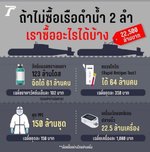
die oberste Aufgabe des Militärs ist der Schutz des Landes und seiner Bevölkerung.
Natürlich sagt das Militär nicht ... China macht jetzt Druck und will die Kohle für die bestellten u-boote haben,
sondern man sagt in der Presse - das th. Militär will die u-Boote jetzt haben.
Aber Thailand könnte bei China anmelden, sie sollten den bestellten Sinovac Impfstoff mal einem Update verschaffen,
aber China hat jetzt andere Probleme und muss sich auf den Weltraumkrieg vorbereiten (wer schiesst schneller die Satelitten des Gegners ab)
und so geht der ganze Wahnsinn weiter.

Anutin insists AZ lift local jab target from 3 million
Public Health Minister Anutin Charnvirakul admits he received a letter from the AstraZeneca company saying it has the capacity to supply Thailand with just three million doses of its vaccine a month.
AZ: ihr habt nur 3 mio bestellt
TH: aber wir brauchen doch 10 mio im Monat

Navy pushes ahead with subs buy
The navy is pushing to pay in yearly instalments for the two submarines it is buying, saying it has a duty to propose the spending despite heavy criticism.
China macht Druck

Covid Kurzmeldungen Thailand - So. 18. Juli 2021 - Reisenews Thailand
Das Land hatte in den letzten 24 Stunden wieder ein neues Rekordhoch von 11.397 neuen Covid-19 Fällen und 101 Todesfällen, berichtete das Gesundheitsmi...
Demo in Bangkok...live.
Montag 19.07.
Chonburi wird in die Liste der „dunkelroten“ oder maximalen und strengen Kontrollzonen aufgenommen, um zu versuchen, eine weitere Verbreitung von COVID-19 zu verhindern.

 aseannow.com
----------------------------
aseannow.com
----------------------------
Da die COVID-19-Infektionen in den meisten thailändischen Provinzen unaufhaltsam zunehmen, hat das Center for COVID-19 Situation Administration (CCSA) die Provinzen Ayutthaya, Chachoengsao und Chon Buri zu den „maximal kontrollierten und eingeschränkten“ oder „dunkelroten“ Zonen hinzugefügt.

 aseannow.com
----------------------
aseannow.com
----------------------
BANGKOK (Reuters) – Die thailändische Regierung kündigte am Sonntag Pläne für eine strengere Sperrung in Bangkok und in den Hochrisikoprovinzen nächste Woche an, indem sie die meisten Inlandsflüge aussetzte und die Ausgangssperren ausweitete, nachdem das Land den dritten Tag in Folge mit Rekordzahlen von COVID-19-Fällen gemeldet hatte.

 aseannow.com
--------------------------
aseannow.com
--------------------------
Menschen, die in „maximal kontrollierten und eingeschränkten“ oder „dunkelroten“ Gebieten Thailands leben, wird angewiesen, ihren Wohnsitz nicht zu verlassen, es sei denn, es ist notwendig, Lebensmittel oder Medikamente zu kaufen, sich medizinisch behandeln zu lassen, sich impfen zu lassen oder zu ihren Büros zu gehen, weil sie können nicht von zu Hause aus arbeiten.

 aseannow.com
--------------------------
aseannow.com
--------------------------
BANGKOK (Reuters) – Inlandsflüge von und nach Bangkok und anderen Provinzen, die von der thailändischen Regierung als hohes Risiko für COVID-19 eingestuft wurden, werden ab dem 21. Juli ausgesetzt, teilte die thailändische Zivilluftfahrtbehörde (CAAT) am Sonntag mit.

 aseannow.com
aseannow.com
Es ist jetzt nur noch einen kleinen Sprung,den Hauptflughafen Suvarnabhumi auch zu schließen.
--------------------------
Das thailändische Gesundheitsministerium wird den Export des lokal hergestellten AstraZeneca-Impfstoffs vorübergehend einschränken, um eine ausreichende Versorgung für den häuslichen Gebrauch nach der unerbittlichen Verbreitung von COVID-19 im Land sicherzustellen.

 aseannow.com
---------------------
aseannow.com
---------------------
Die 60.000 Dosen des Sinopharm-Impfstoffs, die von der Chulabhorn Royal Academy (CRA) aus China bestellt wurden, sind seit Buchungsbeginn um 8 Uhr am Sonntag vollständig abonniert.

 aseannow.com
------------------------
aseannow.com
------------------------
Ein durchgesickertes Dokument von AstraZeneca an die thailändische Regierung zeigt, dass das thailändische Gesundheitsministerium in einer Vereinbarung mit dem Impfstoffhersteller im vergangenen September nur 3 Millionen Dosen pro Monat gefordert hat.

 aseannow.com
----------------------
aseannow.com
----------------------
Bangkok, Thailand – Ein Sprecher des Außenministeriums in Bangkok gab heute Abend, den 18. Juli 2021, bekannt, dass Ausländer über 75, die in Thailand wohnhaft sind, am Hauptbahnhof von Bang Sue einen Covid-19-Impfstoff erhalten können, indem sie „zu Fuß“ gehen -in“ gültig ab Montag, 19. Juli 2021.

 aseannow.com
----------------------
aseannow.com
----------------------
BANGKOK (Reuters) – Die Polizei setzte Tränengas, Wasserwerfer und Gummigeschosse ein, um Demonstranten zu zerstreuen, die versuchten, am Sonntag gegen das Büro des thailändischen Premierministers Prayuth Chan-ocha zu marschieren, um seinen Rücktritt wegen seines Umgangs mit der Coronavirus-Pandemie und ihren wirtschaftlichen Auswirkungen zu fordern.

 aseannow.com
aseannow.com
Chonburi wird in die Liste der „dunkelroten“ oder maximalen und strengen Kontrollzonen aufgenommen, um zu versuchen, eine weitere Verbreitung von COVID-19 zu verhindern.

Chonburi confirmed as 'dark red' maximum and strict control zone
Chonburi will be added to the list of 'dark red' or maximum and strict control zone in order to try and prevent further spread of COVID-19. According to the Chonburi PR Facebook page, from Tuesday, Chonburi, including Pattaya, will be under further restrictive measures, which will include limitin...
Da die COVID-19-Infektionen in den meisten thailändischen Provinzen unaufhaltsam zunehmen, hat das Center for COVID-19 Situation Administration (CCSA) die Provinzen Ayutthaya, Chachoengsao und Chon Buri zu den „maximal kontrollierten und eingeschränkten“ oder „dunkelroten“ Zonen hinzugefügt.

CCSA remaps Deep Red, Red, Orange and Green areas as COVID-19 pandemic situation worsens
(Photo by Lillian SUWANRUMPHA / AFP) As COVID-19 infections increase relentlessly in most of Thailand’s provinces, the Centre for COVID-19 Situation Administration (CCSA) has added Ayutthaya, Chachoengsao and Chon Buri provinces to the “maximum controlled and restricted” or “Dark Red” zones. The ...
BANGKOK (Reuters) – Die thailändische Regierung kündigte am Sonntag Pläne für eine strengere Sperrung in Bangkok und in den Hochrisikoprovinzen nächste Woche an, indem sie die meisten Inlandsflüge aussetzte und die Ausgangssperren ausweitete, nachdem das Land den dritten Tag in Folge mit Rekordzahlen von COVID-19-Fällen gemeldet hatte.

Thailand expands lockdown areas as COVID-19 cases surge
Oxygen cylinders are seen at a store as demand for oxygen continues to grow amid the coronavirus disease (COVID-19) pandemic, in Bangkok, Thailand, July 17, 2021. REUTERS/Chalinee Thirasupa BANGKOK (Reuters) -The Thai government on Sunday announced plans for a tighter lockdown in Bangkok and high...
Menschen, die in „maximal kontrollierten und eingeschränkten“ oder „dunkelroten“ Gebieten Thailands leben, wird angewiesen, ihren Wohnsitz nicht zu verlassen, es sei denn, es ist notwendig, Lebensmittel oder Medikamente zu kaufen, sich medizinisch behandeln zu lassen, sich impfen zu lassen oder zu ihren Büros zu gehen, weil sie können nicht von zu Hause aus arbeiten.

Stay home measure imposed by CCSA as COVID-19 pandemic worsens in Thailand
(Photo by Lillian SUWANRUMPHA / AFP) People living in “maximum controlled and restricted” or “Dark Red” areas of Thailand are being told not to leave their residences unless it is necessary to buy food or medicines, to seek medical treatment, to get vaccinations or to go to their offices because ...
BANGKOK (Reuters) – Inlandsflüge von und nach Bangkok und anderen Provinzen, die von der thailändischen Regierung als hohes Risiko für COVID-19 eingestuft wurden, werden ab dem 21. Juli ausgesetzt, teilte die thailändische Zivilluftfahrtbehörde (CAAT) am Sonntag mit.
Thailand to halt local flights in COVID-risk areas
FILE PHOTO: The AirAsia counter is closed as lockdown and travel restrictions are imposed to curb the spread of the coronavirus disease (COVID-19) at Don Muang Airport in Bangkok, Thailand, July 12, 2021. REUTERS/Soe Zeya Tun BANGKOK (Reuters) - Domestic flights to and from Bangkok and other prov...
Es ist jetzt nur noch einen kleinen Sprung,den Hauptflughafen Suvarnabhumi auch zu schließen.
--------------------------
Das thailändische Gesundheitsministerium wird den Export des lokal hergestellten AstraZeneca-Impfstoffs vorübergehend einschränken, um eine ausreichende Versorgung für den häuslichen Gebrauch nach der unerbittlichen Verbreitung von COVID-19 im Land sicherzustellen.

Thailand wants to limit export of locally-produced AstraZeneca vaccine
(Photo by LOIC VENANCE / AFP) Thailand’s Ministry of Public Health is to go ahead with a temporary restriction on the export of locally-produced AstraZeneca vaccine, to ensure sufficient supply for domestic use, in the wake of the relentless spread of COVID-19 in the country. Public Health Minist...
Die 60.000 Dosen des Sinopharm-Impfstoffs, die von der Chulabhorn Royal Academy (CRA) aus China bestellt wurden, sind seit Buchungsbeginn um 8 Uhr am Sonntag vollständig abonniert.

60,000 doses of China’s Sinopharm vaccine fully subscribed in 90 minutes on Sunday
(Photo by ISHARA S. KODIKARA / AFP) The 60,000 doses of Sinopharm vaccine, ordered by the Chulabhorn Royal Academy (CRA) from China, have been fully subscribed since bookings started at 8am Sunday. The bookings are for people living in and around Bangkok and in the four southern provinces of Yala...
Ein durchgesickertes Dokument von AstraZeneca an die thailändische Regierung zeigt, dass das thailändische Gesundheitsministerium in einer Vereinbarung mit dem Impfstoffhersteller im vergangenen September nur 3 Millionen Dosen pro Monat gefordert hat.

AstraZeneca says Thailand only requested 3 million doses per month in initial agreement
By Cod Satrusayang A leaked document from AstraZeneca to the Thai government reveals that the Thai Ministry of Public Health only requested 3 million doses per month in an agreement with the vaccine manufacturer last September. In the document, first published by Isra News, the company noted that...
Bangkok, Thailand – Ein Sprecher des Außenministeriums in Bangkok gab heute Abend, den 18. Juli 2021, bekannt, dass Ausländer über 75, die in Thailand wohnhaft sind, am Hauptbahnhof von Bang Sue einen Covid-19-Impfstoff erhalten können, indem sie „zu Fuß“ gehen -in“ gültig ab Montag, 19. Juli 2021.

Ministry of Foreign Affairs announces that foreigners over 75 who are residents of Thailand can get a “walk-in” Covid-19 vaccine at Bang Sue Central Station in Bangkok starting from this Monday
PHOTO: BMA Health By Adam Judd Bangkok, Thailand-A spokesman for the Ministry of Foreign Affairs in Bangkok announced this evening, July 18th, 2021, that foreigners over the age of 75 who are residents of Thailand can get a Covid-19 vaccine at Bang Sue Central Station by “walking-in” effective fr...
BANGKOK (Reuters) – Die Polizei setzte Tränengas, Wasserwerfer und Gummigeschosse ein, um Demonstranten zu zerstreuen, die versuchten, am Sonntag gegen das Büro des thailändischen Premierministers Prayuth Chan-ocha zu marschieren, um seinen Rücktritt wegen seines Umgangs mit der Coronavirus-Pandemie und ihren wirtschaftlichen Auswirkungen zu fordern.
Thai protesters clash with police near Government House
Police spray water cannon during an anti-government demonstration, in Bangkok, Thailand July 18, 2021. REUTERS/Soe Zeya Tun By Vorasit Satienlerk and Juarawee Kittisilpa BANGKOK (Reuters) -Police used tear gas, water cannon and rubber bullets to disperse protesters trying to march on Thai Prime M...
Das wurde zwar schon zitiert aber spannend ist das Verhältnis positiv Getesteter und absolut/gesamt Getesteter – da ist jeder 5. positiv
neues Rekordhoch von 11.397 neuen Covid-19 Fällen
Es werden täglich zwischen 55.000 und 70.000 Tests gemacht.

 www.thailandsun.com
www.thailandsun.com
neues Rekordhoch von 11.397 neuen Covid-19 Fällen
Es werden täglich zwischen 55.000 und 70.000 Tests gemacht.

Covid Kurzmeldungen Thailand - So. 18. Juli 2021 - Reisenews Thailand
Das Land hatte in den letzten 24 Stunden wieder ein neues Rekordhoch von 11.397 neuen Covid-19 Fällen und 101 Todesfällen, berichtete das Gesundheitsmi...


Opinion: Crackdown shows this government can work efficiently; just not to help the people - Thai Enquirer Current Affairs Main
Latest Thailand English Online News Opinion: Crackdown shows this government can work efficiently; just not to help the people Current Affairs Main - Thai Enquirer %
 www.thaienquirer.com
www.thaienquirer.com

Totaler Lockdown nicht ausgeschlossen, Thailand
BANGKOK: Sollten die derzeitigen strikten Beschränkungen in den dunkelroten Zonen nicht wirken und die Zahl der Covid-19-Fälle weiterhin hoch bleiben, ...
Ähnliche Themen
-
Gibts in Thailand eigentlich an Black Friday ?
- Gestartet von Sunpower
- Antworten: 2
-
[Nov 3, 2024] Thailand/Patty bis zum 14.12. Pattaya
- Gestartet von KlausSprizig007
- Antworten: 0
-
-
Mit deutschem Führerschein B 197 + int. FS welchen Roller in Thailand mieten?
- Gestartet von medix
- Antworten: 53
-













